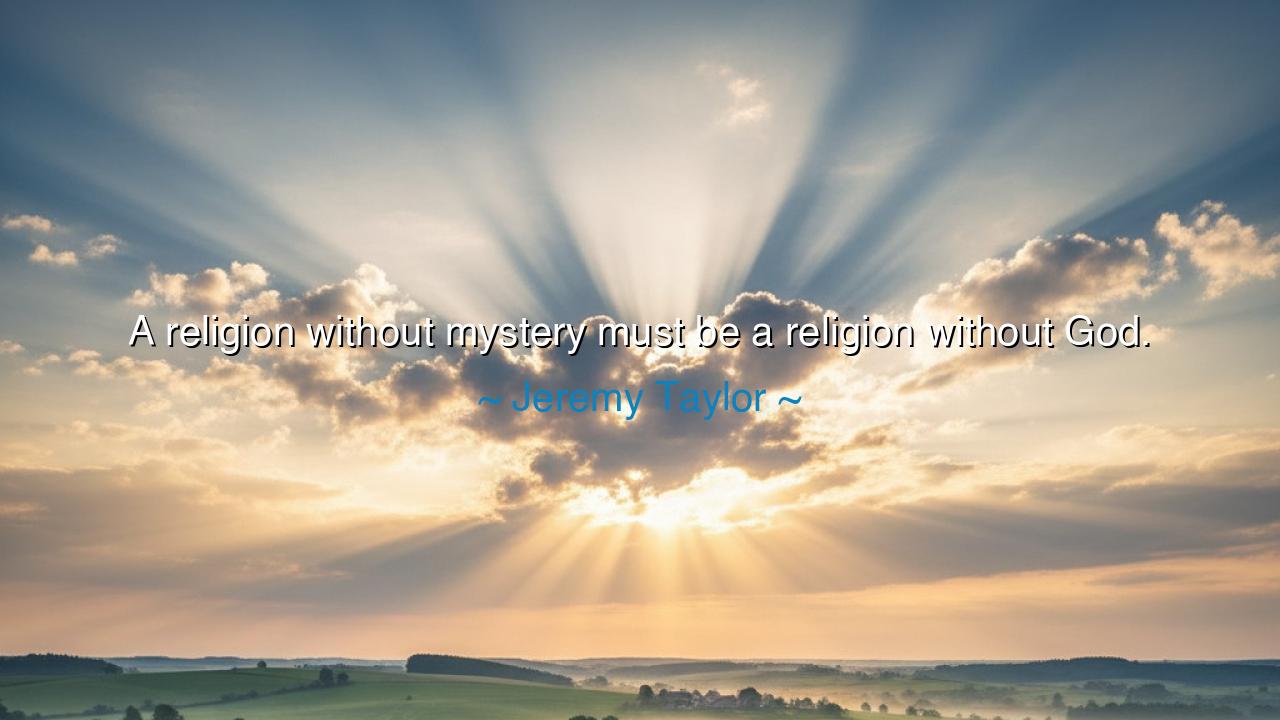
A religion without mystery must be a religion without God.






When Jeremy Taylor, the seventeenth-century theologian and poet of faith, wrote, “A religion without mystery must be a religion without God,” he spoke as one who had peered into both the heart of devotion and the limits of human reason. His words are not a rejection of knowledge, but a hymn to the sacred unknown — a reminder that the divine cannot be contained within the narrow walls of understanding. For Taylor knew that faith begins where logic ends, and that to worship without wonder is to bow not before God, but before one’s own reflection.
Born in an age of turmoil — a time when Europe was divided by wars of religion and men sought to define the Infinite with the tools of argument — Taylor’s voice rose like a melody amid the noise of contention. He was called the “Shakespeare of Divines,” for his sermons were woven with beauty as much as with doctrine. In this particular saying, he warned against the arrogance of those who sought to strip religion of its mystery, to make of heaven a machine and of the soul a formula. He understood that if God could be fully explained, He would cease to be God; for the divine essence is not an equation to be solved, but a mystery to be experienced.
To say that a religion without mystery must be a religion without God is to affirm that awe is the very breath of spirituality. Mystery is the veil through which the sacred light shines — it humbles the proud and lifts the simple-hearted. It teaches us that there are truths too vast for speech, and beauties too deep for sight. The saints of old did not claim to understand the mind of God; they knelt in silence before it. In that silence, faith was born — not as blind belief, but as trust in the unseen, a courage to love what cannot be measured. Without this sense of mystery, religion becomes a mere philosophy, a pattern of words without the pulse of life.
Consider the story of Isaac Newton, the great scientist who, after uncovering the laws of motion and gravity, still gazed at the stars and confessed that he felt like a child playing on the shore, while the great ocean of truth lay undiscovered before him. Though he mastered the language of the cosmos, he did not banish its mystery — he deepened it. For the closer one comes to understanding creation, the more one stands in awe of its Creator. In this humility lies the wisdom that Taylor praised: that the mystical and the rational are not enemies, but companions — the one leading us to knowledge, the other leading us to reverence.
But when men forget mystery, faith withers into pride. History is filled with those who, seeking to dominate truth, turned religion into dogma without spirit. The Pharisees of ancient days, who knew the law but not the love behind it, are reborn in every age that confuses certainty with sanctity. Taylor’s words call us back to wonder — to see God not as a solved problem, but as the living fire at the center of existence, burning beyond comprehension. Mystery is not ignorance; it is invitation. It calls the soul to humility, to curiosity, to worship that is both joyful and trembling.
In a world where science reveals so much, it is tempting to believe that mystery has vanished. Yet even now, in the age of discovery, the greatest minds stand in awe before the questions that remain. The origin of consciousness, the boundless vastness of the cosmos, the moral yearning of the human heart — all these remind us that mystery endures, and that the sacred still whispers beneath the noise of certainty. Religion without that whisper becomes hollow — a shell of words without the spirit that once animated it.
The lesson, then, is this: do not fear mystery — cherish it. In your search for truth, let wonder be your companion. When you pray, when you look at the stars, when you behold kindness or beauty, do not rush to explain; let yourself be moved by the greatness you cannot name. The mind seeks understanding, but the soul seeks communion. To live with mystery is to walk humbly with God — to know that He is near, even when unseen, and that the questions themselves are sacred.
Thus, remember the wisdom of Jeremy Taylor: a faith that explains everything explains nothing. The holiest part of religion is not the creed written on the page, but the silence between the words — the place where human understanding ends and the infinite begins. For in that silence, mystery and God are one, and the heart that kneels before it truly begins to live.






AAdministratorAdministrator
Welcome, honored guests. Please leave a comment, we will respond soon